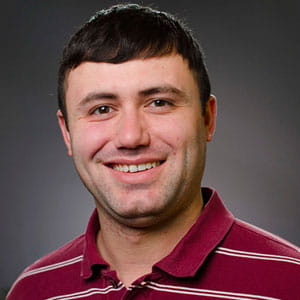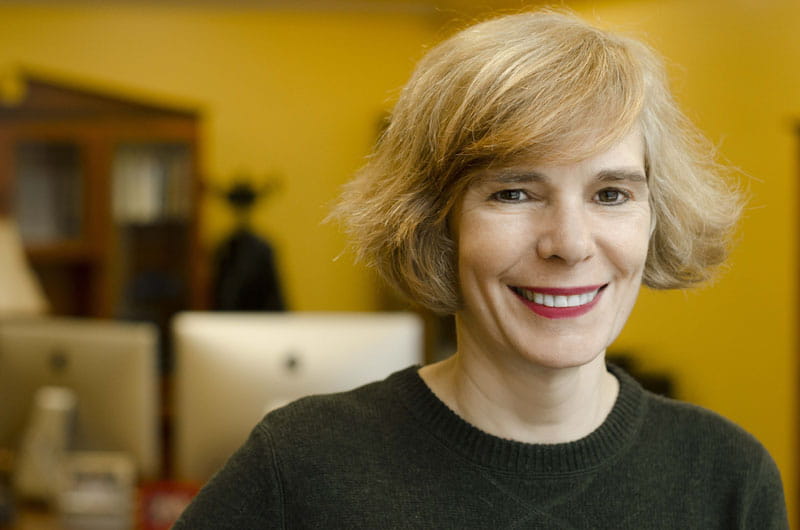A Q&A With School of Education Dean Nancy Songer
 By Frank Otto
By Frank Otto

Before she even started the class, Nancy Songer learned a lesson from her eighth-grade science teacher that stuck with her throughout her life.
“I was given this assignment when I was a seventh grader moving into eighth grade,” said Songer, PhD, who became the new dean of the School of Education last year. “The eighth-grade science teacher came into all the seventh-grade classes and said, ‘You guys have a project. You have to collect 50 different species of insects by the first day of eighth grade.’”
Songer and her classmates took to their bikes and scoured their northern California neighborhoods for the bugs, hunting down butterflies with nets and trapping beetles with jars.
A thrill for Songer and her friends, the summertime project stands out to her as a perfect demonstration of learning in the “Zone of Proximal Development,” a concept first introduced by Lev Vygotsky in the early part of the 20th century. The idea is that important learning takes place in and through dialogue with others and when individuals are challenged beyond what they are capable of doing on their own.
It was a “stretching” experience, Songer said, something that she’s kept in mind in all of her endeavors in the education field.
Now the head of Drexel’s School of Education, which is newly expanded out of the Goodwin College of Professional Studies, Songer is contemplating new challenges as she helps the school through its own stretching experience.
Songer talked about the Philadelphia education community, the challenges the School of Education faces, and how she goes about improving herself to meet those challenges.
Q: You come to Drexel from the University of Michigan. What did you do there?
A: My background is as a faculty member in Science, Technology, Engineering and Mathematics (STEM) Education. I had 20 years of leading large National Science Foundation research projects that were based in urban schools. I ended up securing about $22 million in federal funding and most of that funding was in partnership with the Detroit Public Schools.
We did a lot of work transforming and improving the quality of instruction and the learning outcomes that the students were able to demonstrate from fourth through 10th grade.
A lot of the initiatives I’m leading at Drexel are drawn from a career of thinking about what you want teaching and learning environments to be, and how you can focus more on critical thinking and more complex kinds of reasoning as opposed to surface-level memorization.
Q: What drew you to Drexel? What was appealing?
A: There were a couple different pieces that I think were really attractive about this job.
Since the School of Education was establishing itself as a new college, there was a fantastic opportunity for the new dean to guide thinking in who we are as a school of education and what we want to be. How do we want to grow and how do we want to focus our areas of expertise and offerings?
A second attraction was that the University had partnered with the School District of Philadelphia to look at the potential of building a new kindergarten-through-eighth-grade elementary and middle school on the site of the former University City High School. When I was interviewing for the dean position, President [John] Fry mentioned that the new dean of the School of Education would have the opportunity to be involved in shaping the school.
Also, he mentioned his vision of having a new academic building to house the School of Education and having it located near the new elementary and middle school. Once I understood that the job demanded tremendous creativity and leadership in shaping both the School of Education and a new public school, I found the job to be irresistible. The work seemed exceptionally challenging but fun. In other words, another “stretching” exercise for me as a leader because the position had these visionary and creative parts.
Q: In a Chronicle of Higher Education article that discussed deans as agents of change, you were quoted. How important is it for deans to shake things up?
A: I think the Chronicle article really captured some ways in which dean jobs are changing. We’re not autonomous but we have a greater amount of decision-making power than in the past.
I think some deans in the past used to be more of what I think of as a glorified department chair. Somebody else was making all of the big decisions in terms of finance and management. While these deans had some say and management responsibility, mostly they were carrying out somebody else’s vision. These deans were not the creative leader.
More recently, I see deans as having greater leadership responsibilities and leadership potential. I definitely see that in this particular dean job with the opportunity to craft or guide how the School of Education grows and then how it works with issues in the Philadelphia public schools. Those are real leadership opportunities and if I were a person that wasn’t comfortable with thinking about those things, then I wouldn’t be the right person for this job.
Q: Do those responsibilities help schools from becoming stagnant?
A: Well, we don’t really have the luxury of being stagnant. Financially, higher education is having a tough time. We have to be careful financially and we have to be smarter strategically with both money and resources so, yes, stagnant isn’t going to work.
Q: In the Chronicle, you also talked about always trying to learn about your job. As a member of the faculty or staff, what are the best learning resources that you’ve come across to help stay engaged in your field?
A: I do a bunch of reading of basically what’s going on in higher education leadership right now.
But, also, I talk to a lot of people. I have regular communication with other deans here. I have friends who are deans at other universities and I talk to them all the time. I also have several leadership resources, including a sister and a brother who have corporate leadership positions.
I draw on a lot on other leaders I’ve had, other deans I’ve had. I’ve had a lot of conversations with a couple people expressing, “Here’s an area I’m kind of struggling with, do you have advice about that?”
Q: Is it a challenge or a resource to be located in a city with so many different universities, including one right in our backyard?
A: It’s a really good thing.
For example, I just hosted a lunch with Temple University’s dean of the College of Education and the dean of the University of Pennsylvania’s Graduate School of Education and we all got together and, we’re all fairly new, but we have a lot to talk about. We have a lot to share in terms of what’s going on, what kinds of initiatives we are all doing and how we can partner and work together and collectively address some of these problems as a team.
We’re trying to tackle these problems together. We recognize that all of the problems we’re having, including Schools of Education in difficult financial times and trying to have an impact on local schools, are really complicated problems.
My feeling is, it’s going to be hard enough even if we’re working together. I do believe that, by joining together, our potential is tremendous.
Q: What types of initiatives would you like to install in the School of Education for the community?
A: There’s this idea that, in addition to that cradle-to-grave type of learning in schools, there’s also something called “life-wide learning.” Basically, there are studies that say our learning from formal schooling, kindergarten through high school or college, is 18 percent of your time.
What that means is 82 percent of our lives, outside of formal school settings — on your weekends, at home, in museums, in the workplace — there’s a great deal of other learning going on that we’re not really using or thinking about.
What we want to do is become experts in many different parts of this lifelong and “life-wide learning” experience. We want to become a resource for both Drexel University and the community in learning across many different ages and many different settings.
To do this work, we are going to open an office in the School of Education called the School Work Studio.
“Studio” refers to both the place where artists do their creative work and it also refers to all of the creative people involved in the creative work. Your dance studio includes all the dancers, for example. I like this term because, as I mentioned before, there are many creative sides to actually studying and understanding what makes learning work. I also believe the many contributors in a studio are necessary for the collective work to get done.
The “School Work” part of the title refer to a couple different things: First of all, Drexel is very co-op focused, of course. I feel that this School of Education work can help in many different school-to-work transitions.
We can help undergraduates getting teacher training to become classroom teachers. We can help graduate students become either leaders at community colleges or leaders in education policy, for example.
We can help kindergarten through 12th-grade kids go from their education to different kinds of college and/or internship situations.
So, “School Work” is sort of a reference to the school-work transition and the knowledge people need to do various kinds of work around, in and about schools.
Q: Where does your motivation to help local education come from? You did it in Detroit and now you plan to do it in Philly.
A: I’m not sure. (laughs).
I just think it’s what we should be doing. If you visited any urban school, it’s just so easy to see that there are huge opportunities there. So there are really, really good teachers and really good principals, but the challenges they’re facing are crazy large. They’re enormous.
So whenever I look at that, we have knowledge, we have people, students that could be student teachers, people that can provide assistance in classrooms, maybe through a co-op experience at Drexel, to help the special needs kids — we have the resources and the sharing of resources in the university and work of this kind is also a really great educational experience for our people.
I just feel like that’s a total win-win. I just think this is our business. Our business is teaching and learning. We have the resources, so why not use it, especially in our neighborhood?
This article first appeared in the spring edition of Drexel Quarterly.